Link building has become pivotal for software as a service (SaaS) brands.
A successful link building initiative can explode organic visibility.
But SaaS link building requires a unique approach.
In this article, we’ll show you how it differs from other industries and cover some of the specific challenges and opportunities it presents. I will also unravel eight link building techniques that are popular with SaaS companies right now.
Finally, I’ll provide a guide to implementation, which will help you launch a successful SaaS link building program. I even include sample objectives and key results (OKRs).
After reading this article, you’ll be able to ensure your link-building efforts are effective.
But everything starts with the basics.
Basics Of SaaS Link Building
In SaaS, link building focuses on crafting quality, informative content that bloggers and publishers value.
This content can include client studies, app data, product comparisons, feature-related content, customer surveys, and executive bios or quotes.
This has become very popular because bloggers and publishers want sources that enhance the experience for their readers.
Link building techniques that are effective now encompass guest posting, competitor link reclamation, promoting content on social media, and link exchanges.
Impact Of Link Building On SaaS Companies
Backlinks can significantly grow a SaaS company’s organic visibility, keyword ranking, online reputation, demo requests, leads, and sales.
Backlinks with helpful content will drive both top and bottom-of-funnel keywords visibility.
Let’s look at the case of the SaaS brand Toast, which grew its traffic to over 600,000 monthly hits through strategic SEO, content marketing, and link profile growth. This example demonstrates the importance of focusing on building links to helpful content.
Case Examination
Toast, a versatile point of sale (POS) and management system, caters to various food establishments, including restaurants, bars, food trucks, and hotel eateries.
Despite numerous short-tail keywords registering low to medium search volumes, Toast’s organic visibility and traffic have consistently shown improvement. As of June 2023, its average monthly organic clicks exceed 600,000 (Ahrefs).
Nonetheless, many keywords that an SEO pro might prioritize register low search volumes.
“POS system,” for instance – the top product-related search term – only garners 33,100 average monthly searches as of June 2023, according to Google Keyword Planner.
Therefore, to achieve its traffic growth targets, Toast would need to target a significantly broader array of keywords.
A correlation is evident between traffic overlap and the count of referring domains in the Ahrefs overview report.
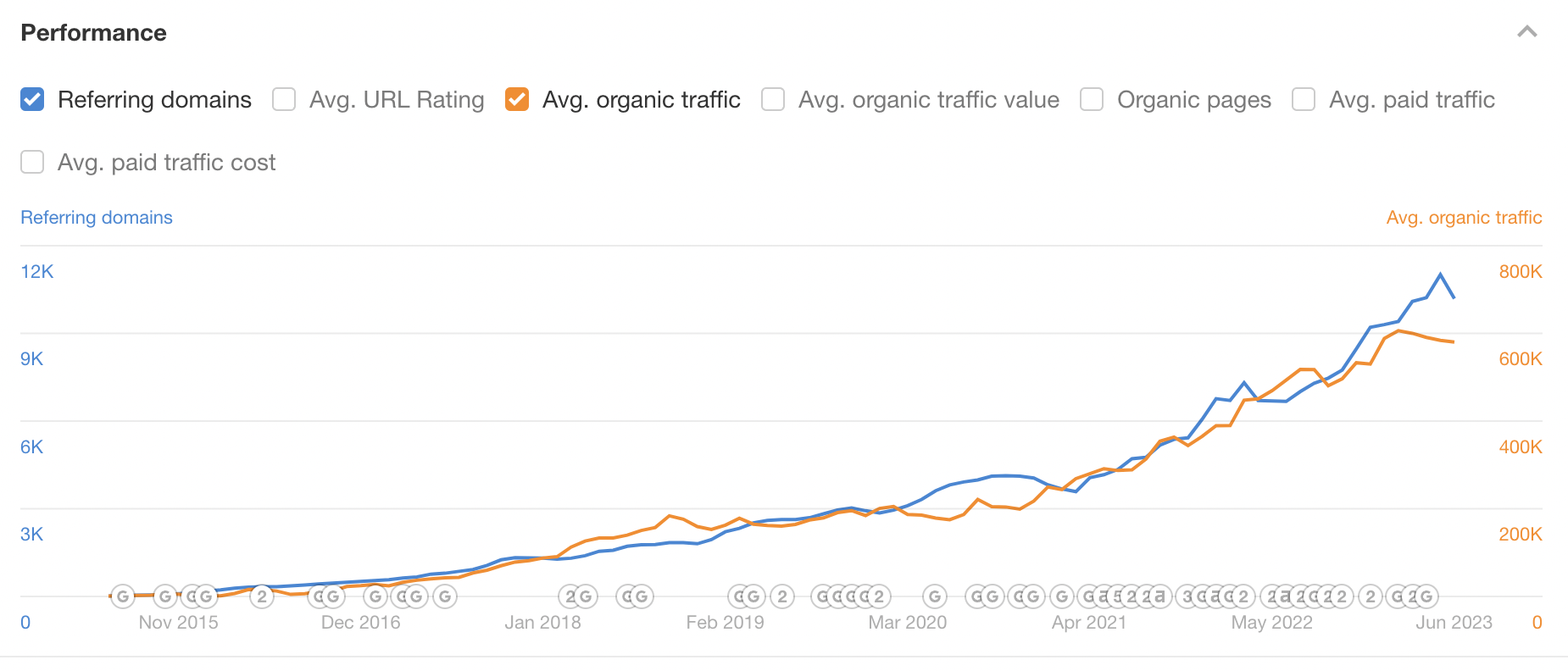 Screenshot from Ahrefs, June 2023
Screenshot from Ahrefs, June 2023The Top Pages report reveals that the top trafficked pages are mostly on the /blog sub-folder, along with the /restaurant-pos and a few money pages (i.e., high-converting pages).
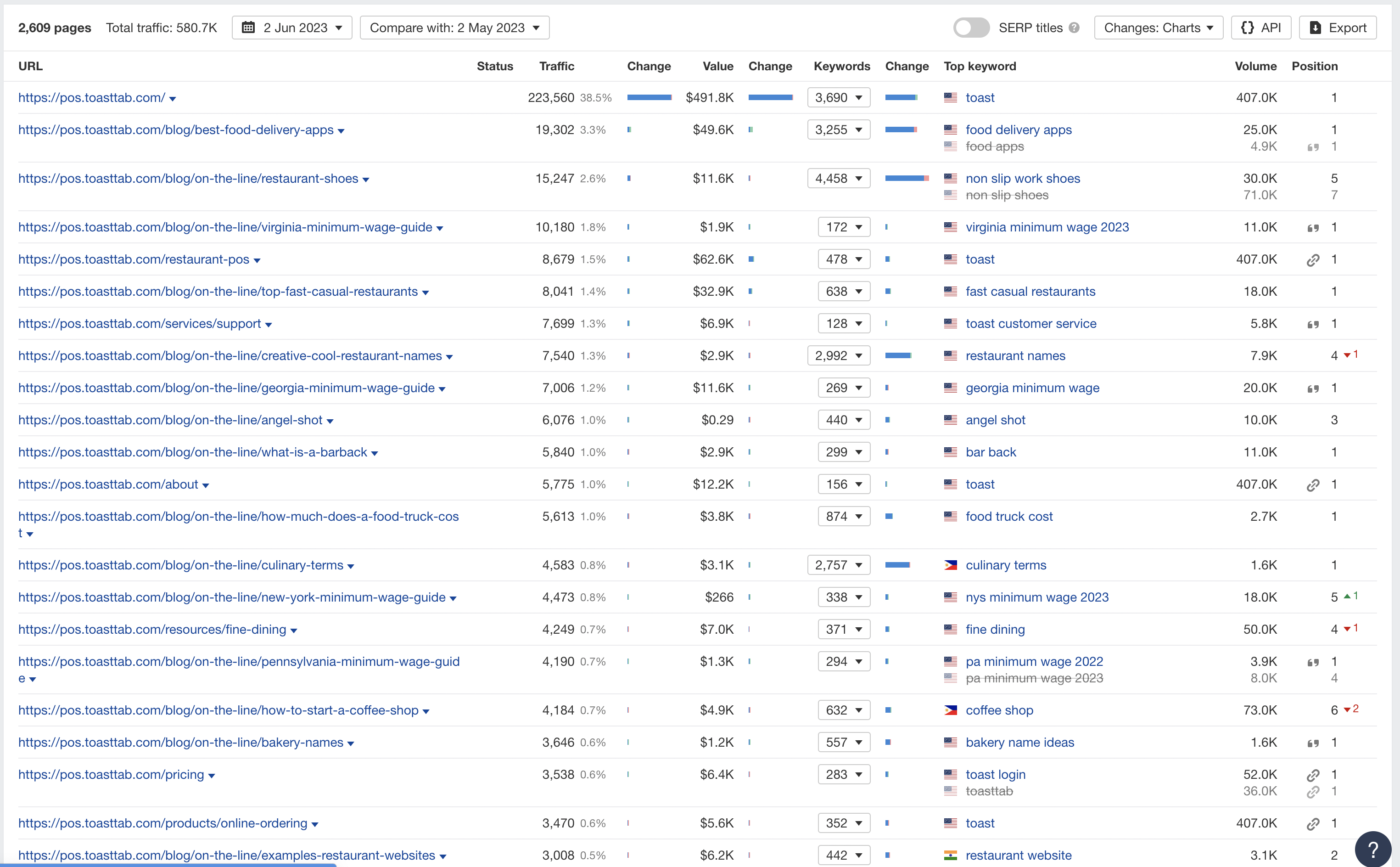 Screenshot from Ahrefs, June 2023
Screenshot from Ahrefs, June 2023Of these top pages, some generate a lot of links but little traffic. This is really important.
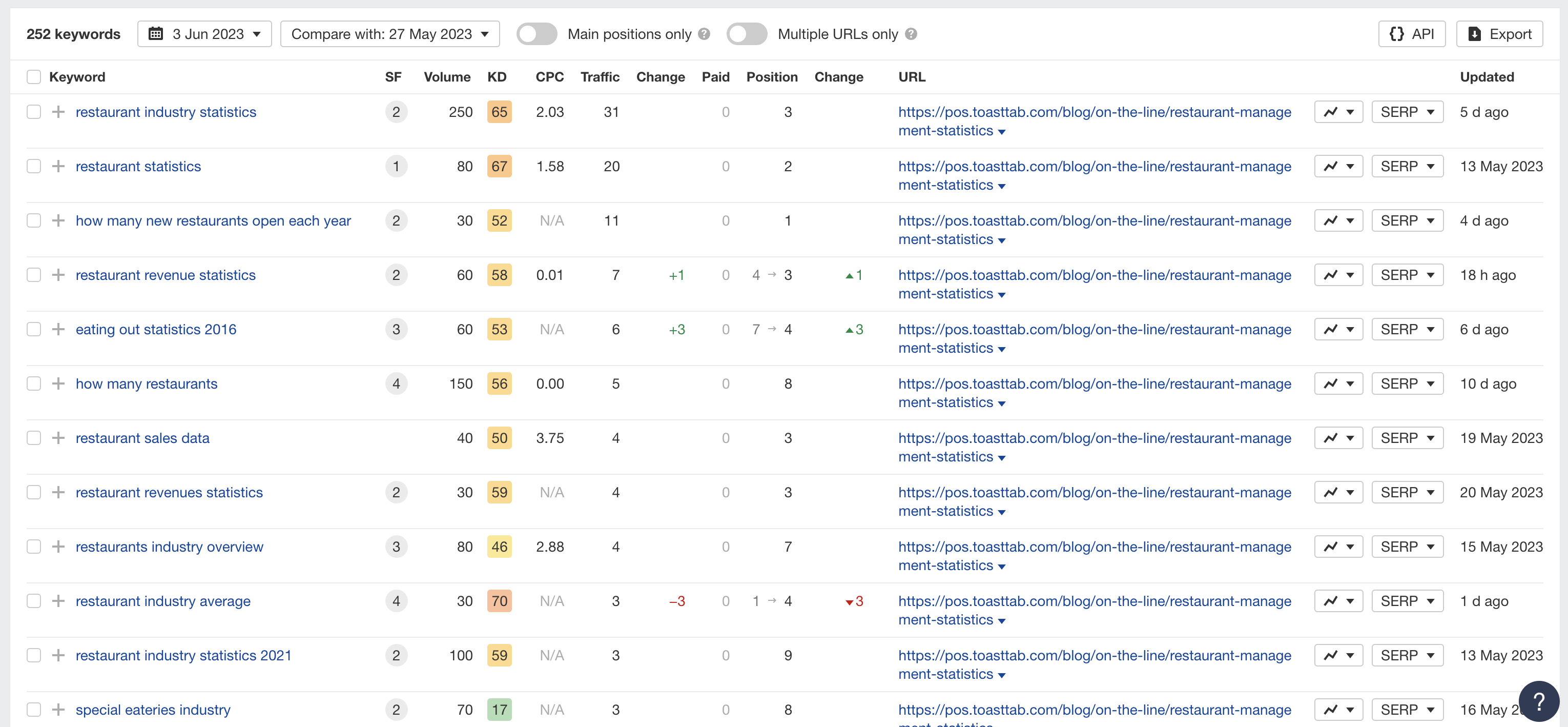 Screenshot from Ahrefs, June 2023
Screenshot from Ahrefs, June 2023These pages would rank for keywords that journalists or bloggers use to find article resources – thus generating links without doing outreach.
- /blog/on-the-line/restaurant-management-statistics
- /resources/restaurant-success-industry-report
Further examination of the Best by links report shows that blog articles, statistics articles, and industry reports receive the most links.
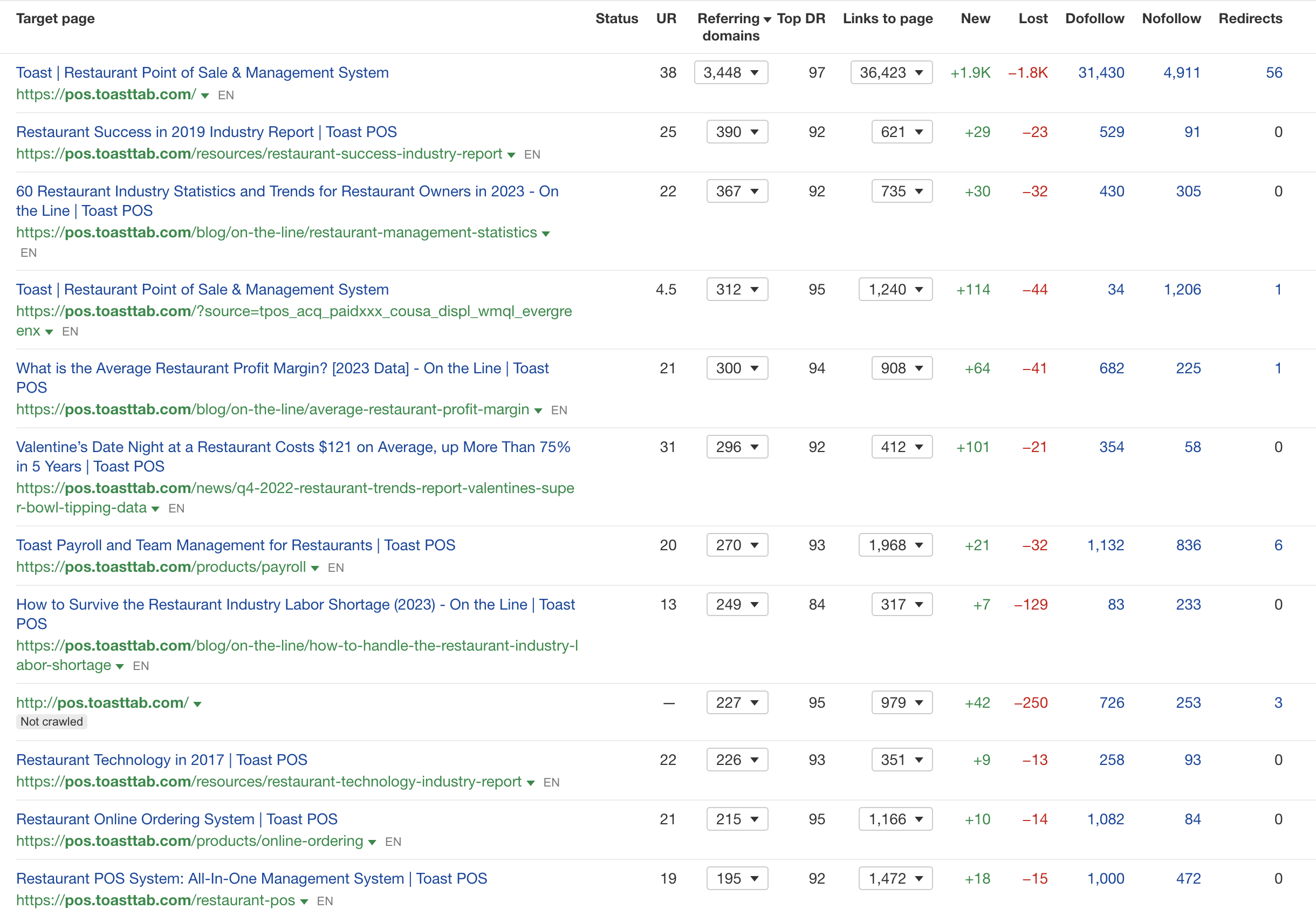 Screenshot from Ahrefs, June 2023
Screenshot from Ahrefs, June 2023This examination reveals several crucial insights:
- Persistent link building over time can indirectly boost rankings.
- Enhancing links to linkable assets can uplift the rankings of other pages.
- A thorough evaluation of top-ranking content on search engines reveals that even if these pages don’t have many direct links, their rankings might be influenced by the link profiles of other pages.
- On a page-by-page basis, statistical and research content tends to generate more links than other types.
This type of growth is possible in non-SaaS business types, but there are differences.
Link Building In SaaS Vs. Other Industries
Explanation Of The Unique Aspects Of B2B SaaS Link Building
Given their involvement with innovative technologies and solutions, these companies can generate a range of technical and high-value content across a large variety of topics that can appeal to a wide range of niche sites.
General site content can include:
- Competitor comparison pages.
- Integration pages.
- Glossaries.
- Product feature pages.
Long-form informational content may include:
- Demonstrate the software in a vertically-aligned case study.
- Studies with data-driven insights from your user base.
- Linkable content assets for industry roundups for direct competitors or industry influencers.
- Case studies or examinations of how customers are solving problems with your tool.
For example, the Link Tree SEO Case Study by Ahrefs and Toast’s statistical roundup article, which generated 360 unique referring domains links.
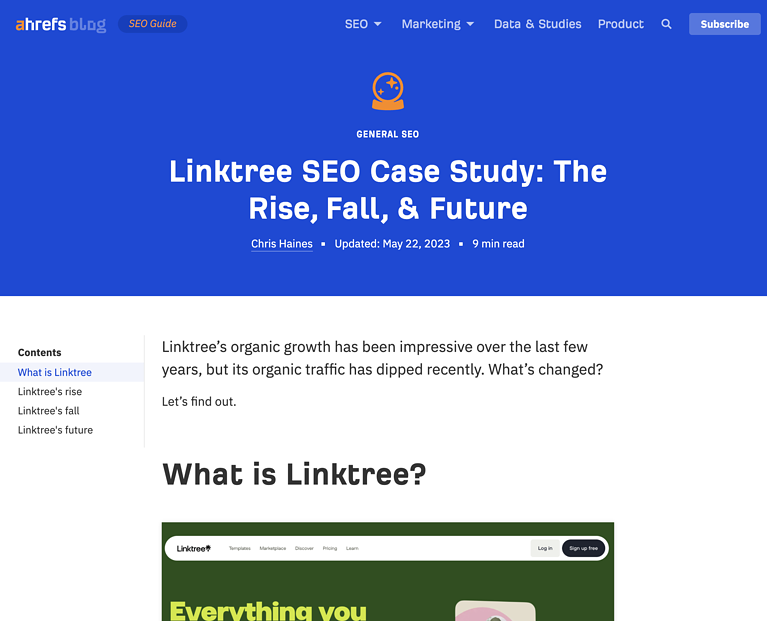 Screenshot from Ahrefs, June 2023
Screenshot from Ahrefs, June 2023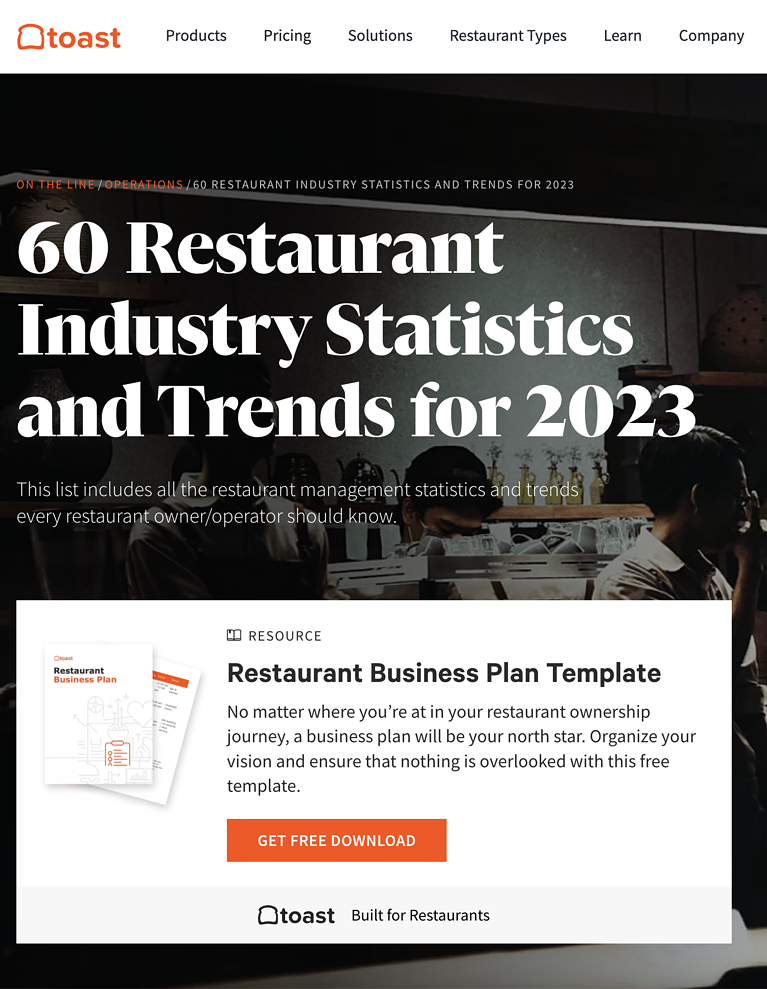 Screenshot from toast, June 2023
Screenshot from toast, June 2023Be unique!
Unique Challenges Of B2B SaaS
SaaS, especially in B2B, has several challenges that can slow down progress in building a strong link profile. A few key ones are:
- Complex topics: Creating link-worthy content around technical or complex topics is challenging. The topics typically require a subject matter expert (SME) for content and sometimes for link building.
- Niche audiences: SaaS can have a very specific audience, making it tricky to find online communities and conversations around the topic. The topics and outreach strategy should be highly relevant and targeted to connect.
- Limited backlink opportunities: The more narrow the niche, the fewer linking opportunities tend to be available. This is often a big challenge, but as you can see from the Toast example above, SaaS companies can broaden content topics to attract a wide range of topics for sites.
6 Popular Link Building Techniques For B2B SaaS
Each of these ways to build SaaS links has its own unique processes for selecting target pages, list building, outreach methods, and templates.
Contextual Guest Blogging
Guest blogging refers to the practice of writing and publishing content on external websites or blogs. This strategy not only helps to establish your authority in your industry, but also gives you the opportunity to earn high-quality backlinks from reputable websites.
Finding these opportunities is the easiest of all techniques. A simple process is:
- Search Google, or your favorite list-building tool, with a search operator: {keyword} intitle:contributor. Swap out “contributor” with “guest contributor,” “guest blog,” “write for us,” or another variation.
- Create a bulk list, then upload it to Ahref’s bath analysis tool. Export the list to filter by DR, and find the most authoritative and relevant audiences first.
- Build out your bio to demonstrate expertise in the website’s niches.
- Do a search on the target websites for content gaps.
- Create a unique article pitch of three topics.
Social Ads For Linkable Content
This method advertises the best and most sharable content with a niche audience through remarketing or lookalike audiences. Although the links from the ads don’t provide much value, a great linkable asset can start to build links naturally if shared with the right audience.
This can include:
- Remarketing on Facebook, Twitter, or LinkedIn.
- Reddit niche ads.
- Lookalike audiences of those that engage with your content the most.
One example that I see a lot, I’m assuming because I read their blog or am a lookalike audience, is Ahrefs’ ads for an information architecture article.
Although Ahrefs certainly has case studies or unique data that is more linkable, sometimes a simple topic may be the most relevant to the niche.
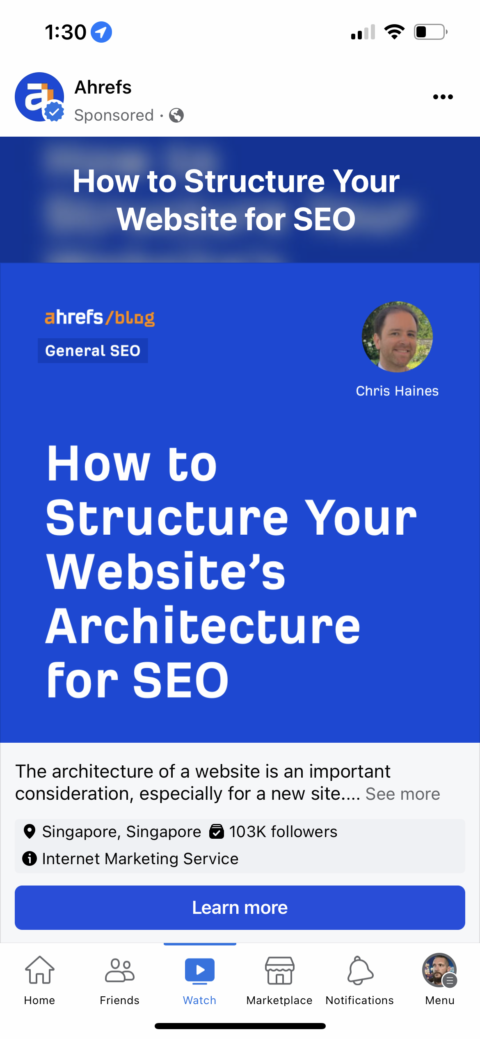 Screenshot from Ahrefs, June 2023
Screenshot from Ahrefs, June 2023Passive PR For Management & Team Members
A popular method in SaaS right now is answering questions and providing subject matter experts (SMEs) as sources for bloggers and journalists.
New tools are popping up in passive PR, but many of them seem to pull directly from HARO. Here are a few unique networks that are good starting points for researching and pitching.
Competitor Mentions Links
Poaching a competitor’s link profile is one of the most satisfying tasks in SEO – not to mention they are easier to secure in many situations.
Finding competitor backlinks either by doing an article search on Google or checking the competitor’s backlinks in Ahrefs or majestic.com.
Here are some article types to search that are highly likely to link to your content, too.
- Alternative products: An article about “alternatives to” a competitor’s product
- Listicles: List your competitors that don’t list your brand
- Just general mentions of competitors in informational content
Resource Links
A resource page is a webpage that provides useful links and resources, typically within a specific industry or interest. Although the old-school pages with a list of links are still around, SaaS companies can find a lot of software listicles and resource articles.
This HubSpot example is a typical resource list article. If you truly have a valuable resource, reaching out to the author or site may yield a highly valuable link with no content production needed.
Find these with a simple variation of the following search operator:
Intitle:{keyword} and (intitle:best OR intitle:resource OR intitle:top)
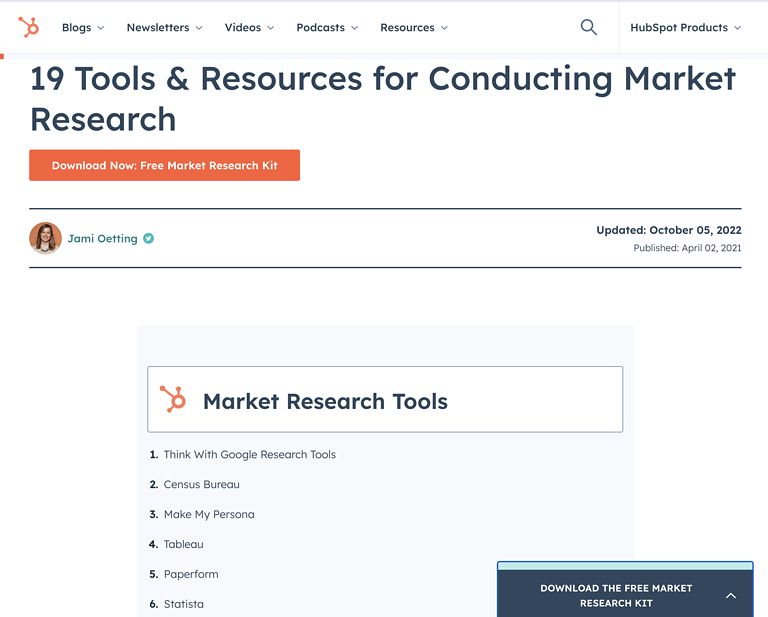 Screenshot from HubSpot, June 2023
Screenshot from HubSpot, June 2023Reciprocal/Link Exchange
In the context of link building for SEO, link exchange refers to a practice where two or more websites mutually agree to promote each other’s links on their respective sites.
But some companies also do a three-way/A, B, C link exchange involving 3 or more websites. Here’s how it works:
- Website A links to website B.
- Website B links to website C.
- Website C links back to website A.
It’s worth noting that “excessive link exchange” would violate Google’s link spam guidelines.
But, implementing these techniques is the hard part.
Implementing A Successful Link Building Campaign
Consistency In Link Building
It’s very important to have consistency and a long-term focus. Although generating a few links to a commercial page may rank it quickly, in most scenarios, building links on a consistent schedule over a long time will drive larger traffic growth.
It’s important to consistently monitor the performance of your backlinks and optimize your strategies as needed.
This is a great segue for discussing data in link building.
Tracking And Analyzing
How you analyze data can kill or grow a program. This means that selecting the right key performance indicators (KPIs) can determine if the program was successful or a failure.
Metrics to evaluate a program include:
- Count of links: Can you even get links from the campaign? Check the count of links directly and indirectly built from the campaign. Indirect links roll in after the campaign is completed, but latent links will come in due to all of the promotions.
- Site quality: Quality comes down to whether the site will improve ranking.
- Increase in organic impressions: Using Google Search Console (GSC), monitor the organic impressions.
- Small ranking improvement: Moving keywords from low-ranking positions to page two of Google is a leading indicator that the links are working.
- Tertiary content/keyword rankings: A lot of times, keyword ranking will improve for pages and keywords that are not being targeted but are in the same cluster of content or keyword topics.
- Target URL head-term ranking: Are the main keywords moving to a page 1 position?
- Cluster visibility score: A visibility score is a point system that scores a site based on a weighted keyword ranking. For a topical keyword category or cluster, how many keywords are ranking across the category?
Data-driven Optimization
I like to use objectives and key results (OKRs), which is a goal-setting framework that helps organizations set challenging goals with measurable results. Here are two sample OKRs for link building.
OKR 1
SEO Objective 1: Establish a proof of concept with a pilot program demonstrating the ability to build relevant links for existing product lines and target audiences.
Key results:
- Identify 10+ high-authority, industry-relevant websites to target for backlinks.
- Create and publish one high-quality linkable asset.
- Secure five or more backlinks from diverse domains to improve topical relevancy.
Optimization based on performance:
Did the campaign secure more than 10+ links? If not, then analyze the pitch, source author, and content relevancy to that audience. Test new authors in the company, using executives or the C-suite.
OKR 2
SEO Objective 2: Expand the topical relevancy of the site around X keyword/topical clusters for a new product launch.
Key Results:
- Create five pillar content piece studies, guides, and how-to documents around X topic.
- Secure three to five links from a niche in X category.
- Increase organic visibility for X keyword cluster by 10%.
Optimizations based on performance:
If no increase in organic visibility, evaluate how “helpful” the content is and it compares to top-ranking content for the same keywords.
Rounding Out
By studying successful cases like Toast and understanding the unique aspects of link building in the SaaS industry, you can design and implement a highly effective link building program.
Moreover, using popular techniques such as guest blogging, influencer marketing, and competitor link building, your SaaS company can grow and thrive in the digital space.
Just remember, the key to a successful link building campaign is consistency, regular content production, and continual relationship building.
Coupled with effective tracking, analysis, and data-driven optimization, your SaaS business can grow significantly.
More resources:
Featured Image: metamorworks/Shutterstock
Source link : Searchenginejournal.com
